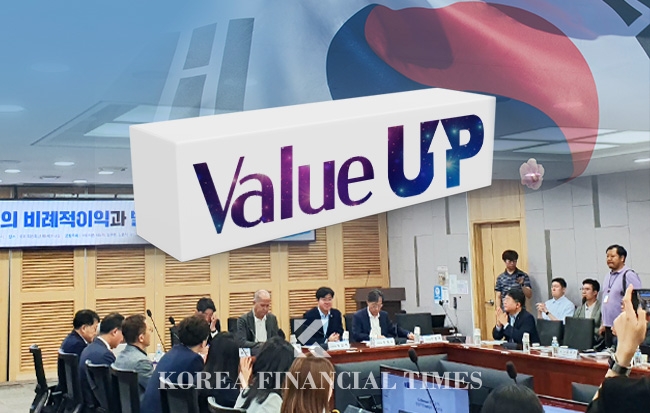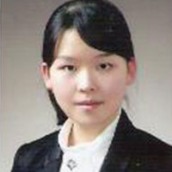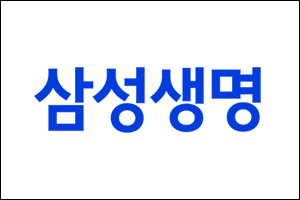
On the 23rd, the 'Shareholders' Proportional Interest and Valuation Debate' was held at the National Assembly in Yeouido.
There were also calls for amendments to the Commercial Code to extend directors' fiduciary duties to shareholders.
The 'Shareholders' Proportional Interest and Valuation Debate' was held at the Yeouido National Assembly on the 23rd, co-hosted by lawmakers from the opposition Democratic Party of Korea, including Park Sang-hyuk, Kang Joon-hyun, Kang Hoon-sik, Kim Nam-geun, Lee Jung-moon, Yoo Dong-soo, Min Byung-duk, and Oh Ki-hyung.
Woojin Kim, a professor of business administration at Seoul National University, spoke on “Analyzing the Causes of the Korean Discount: Return on Equity (ROE) and Cost of Capital for Listed Companies.
Prof. Woojin Kim explained the causes of the Korean discount, saying, “In the situation of ‘ROE < r’ (required rate of return), the company continues to reinvest instead of returning to shareholders, and the situation of PBR < 1 (price-to-earnings ratio) is deepening due to investments with a negative net present value (NPV).
He also cited conflicts of interest between controlling shareholders and common shareholders, resulting in wealth transfers between shareholders and the breakdown of the one-in-N principle.
“Companies need to establish appropriate shareholder return policies by comparing ROE and r, and the government should simultaneously promote policies to protect common shareholders and reform the tax system,” Kim said.
On the same day, Professor Lee Sang-hoon, professor at Kyungpook National University College of Law, presented 'Value Up and Directors' Duty of Loyalty'.
“Profit infringement occurs in the process of transferring corporate value to stock value,” Professor Lee said, adding, ”Currently, Korea's fiduciary duty only recognizes the protection of corporate value, but not the impairment of shareholder and stock value, so the phenomenon of stock price discount is ignored and encouraged.”
For example, M&A (mergers and acquisitions), mergers/divestitures, tender offers, delistings, and mergers that result in an unfair increase in the controlling shareholder's shareholding. He also pointed to cases where the proceeds of a subsidiary listing, such as a spin-off listing, are used to expand management's control rather than returning the proceeds to the parent company's shareholders.
“There is a proposal to amend the Commercial Code to include shareholders in the scope of directors' fiduciary duties,” Prof. Lee said.
The panelists had a variety of opinions on whether the fiduciary duty of directors should be expanded and the implementation of corporate valuation programs.
“Conflicts of interest between controlling shareholders and general shareholders do exist in Korea's corporate governance system, which is based on corporate groups, and I agree with the problem,” said Professor Son Chang-wan of Yonsei University School of Law. ‘However, I am opposed in principle to the introduction of directors’ fiduciary duty to shareholders as a solution, but legislating directors‘ indirect duty to protect shareholders’ interests could be an alternative.”
Dr. Hwang Hyun-young, Capital Market Research Institute, said, “There are various ways to solve the current problem, but one alternative is to prepare a clear regulation on directors‘ duty of loyalty.” “However, the important question is ’how' to make it an effective provision without breaking the entire framework of the current commercial law system,” he said.
In the industry, Park Yoo-kyung, head of EM equities at APG Asset Management, pointed out that “the Korean capital market is still stuck in the 1997 IMF crisis,” and suggested that “I think Korea needs a wake-up program rather than a corporate valuation program.”
From the business community, Kang Seok-gu, head of the research department at the Korea Chamber of Commerce and Industry, said, “I agree with the argument that the cost of capital related to expanding shareholder return for low-ROE companies should be considered, but in reality, the value of profits that are not returned to shareholders will be different from that of a company that reinvests diligently and a company that hoards.” Kang also suggested that there are various side effects of expanding directors' fiduciary duties under the Commercial Code, including increased director liability, shareholder representation lawsuits, and increased penalties for embezzlement.
On the government side, Choi Chi-yeon, head of the Fair Market Division at the Financial Services Commission, said, “We are reviewing various issues to improve governance with related ministries,” and suggested that “we will collect opinions from all sides and try to come up with reasonable alternatives.”
Jeong Suneun (bravebambi@fntimes.com)


























![서울 중구청장, 여야 모두 출마 러시…격전 예고 [6·3지방선거]](https://cfnimage.commutil.kr/phpwas/restmb_setimgmake.php?pp=006&w=69&h=45&m=5&simg=2026020909055800601b372994c951245313551.jpg&nmt=18)





![‘롤러코스터' 삼전닉스…‘방어주 매력' 따져보니 [정답은 TSR]](https://cfnimage.commutil.kr/phpwas/restmb_setimgmake.php?pp=006&w=69&h=45&m=5&simg=2026020723524103702dd55077bc221924192196.jpg&nmt=18)

![[데스크 칼럼] 구본준의 ‘반도체 꿈ʼ](https://cfnimage.commutil.kr/phpwas/restmb_setimgmake.php?pp=006&w=69&h=45&m=5&simg=2026020823315604228dd55077bc221924192196.jpg&nmt=18)












![[그래픽 뉴스] 워킹맘이 바꾼 금융생활](https://cfnimage.commutil.kr/phpwas/restmb_setimgmake.php?pp=006&w=298&h=298&m=1&simg=202602021638156443de68fcbb3512411124362_0.jpg&nmt=18)
![[그래픽 뉴스] 매파·비둘기부터 올빼미·오리까지, 통화정책 성향 읽는 법](https://cfnimage.commutil.kr/phpwas/restmb_setimgmake.php?pp=006&w=298&h=298&m=1&simg=202601281456119025de68fcbb3512411124362_0.jpg&nmt=18)
![[그래픽 뉴스] 하이퍼 인플레이션, 왜 월급이 종잇조각이 될까?](https://cfnimage.commutil.kr/phpwas/restmb_setimgmake.php?pp=006&w=298&h=298&m=1&simg=202601141153149784de68fcbb3512411124362_0.jpg&nmt=18)
![[그래픽 뉴스] 주식·채권·코인까지 다 오른다, 에브리싱 랠리란 무엇일까?](https://cfnimage.commutil.kr/phpwas/restmb_setimgmake.php?pp=006&w=298&h=298&m=1&simg=202601071630263763de68fcbb3512411124362_0.jpg&nmt=18)
![[그래픽 뉴스] “이거 모르고 지나치면 손해입니다… 2025 연말정산 핵심 정리”](https://cfnimage.commutil.kr/phpwas/restmb_setimgmake.php?pp=006&w=298&h=298&m=1&simg=202601061649137526de68fcbb3512411124362_0.jpg&nmt=18)
![[신간] 고수의 M&A 바이블](https://cfnimage.commutil.kr/phpwas/restmb_setimgmake.php?pp=006&w=81&h=123&m=5&simg=2025091008414900330f8caa4a5ce12411124362.jpg&nmt=18)
![[신간] 리빌딩 코리아 - 피크 코리아 극복을 위한 생산성 주도 성장 전략](https://cfnimage.commutil.kr/phpwas/restmb_setimgmake.php?pp=006&w=81&h=123&m=5&simg=2025032814555807705f8caa4a5ce12411124362.jpg&nmt=18)
![[서평] 추세 매매의 대가들...추세추종 투자전략의 대가 14인 인터뷰](https://cfnimage.commutil.kr/phpwas/restmb_setimgmake.php?pp=006&w=81&h=123&m=5&simg=2023102410444004986c1c16452b0175114235199.jpg&nmt=18)


![[신간] 이게 화낼 일인가?](https://cfnimage.commutil.kr/phpwas/restmb_setimgmake.php?pp=006&w=81&h=123&m=5&simg=2026010610254801367f8caa4a5ce12411124362.jpg&nmt=18)

![[AD] 현대차, 글로벌 안전평가 최고등급 달성 기념 EV 특별 프로모션](https://cfnimage.commutil.kr/phpwas/restmb_setimgmake.php?pp=006&w=89&h=45&m=1&simg=20260106160647050337492587736121125197123.jpg&nmt=18)
![[AD] 현대차 ‘모베드’, CES 2026 로보틱스 부문 최고혁신상 수상](https://cfnimage.commutil.kr/phpwas/restmb_setimgmake.php?pp=006&w=89&h=45&m=1&simg=20260105103413003717492587736121125197123.jpg&nmt=18)
![[AD] 기아 ‘PV5’, 최대 적재중량 1회 충전 693km 주행 기네스 신기록](https://cfnimage.commutil.kr/phpwas/restmb_setimgmake.php?pp=006&w=89&h=45&m=1&simg=20251105115215067287492587736121125197123.jpg&nmt=18)
![[카드뉴스] KT&G, 제조 부문 명장 선발, 기술 리더 중심 본원적 경쟁력 강화](https://cfnimage.commutil.kr/phpwas/restmb_setimgmake.php?pp=006&w=89&h=45&m=1&simg=202509241142445913de68fcbb3512411124362_0.png&nmt=18)
![[AD]‘황금연휴에 즐기세요’ 기아, ‘미리 추석 페스타’ 이벤트 실시](https://cfnimage.commutil.kr/phpwas/restmb_setimgmake.php?pp=006&w=89&h=45&m=1&simg=20250903093618029117492587736121166140186.jpg&nmt=18)



